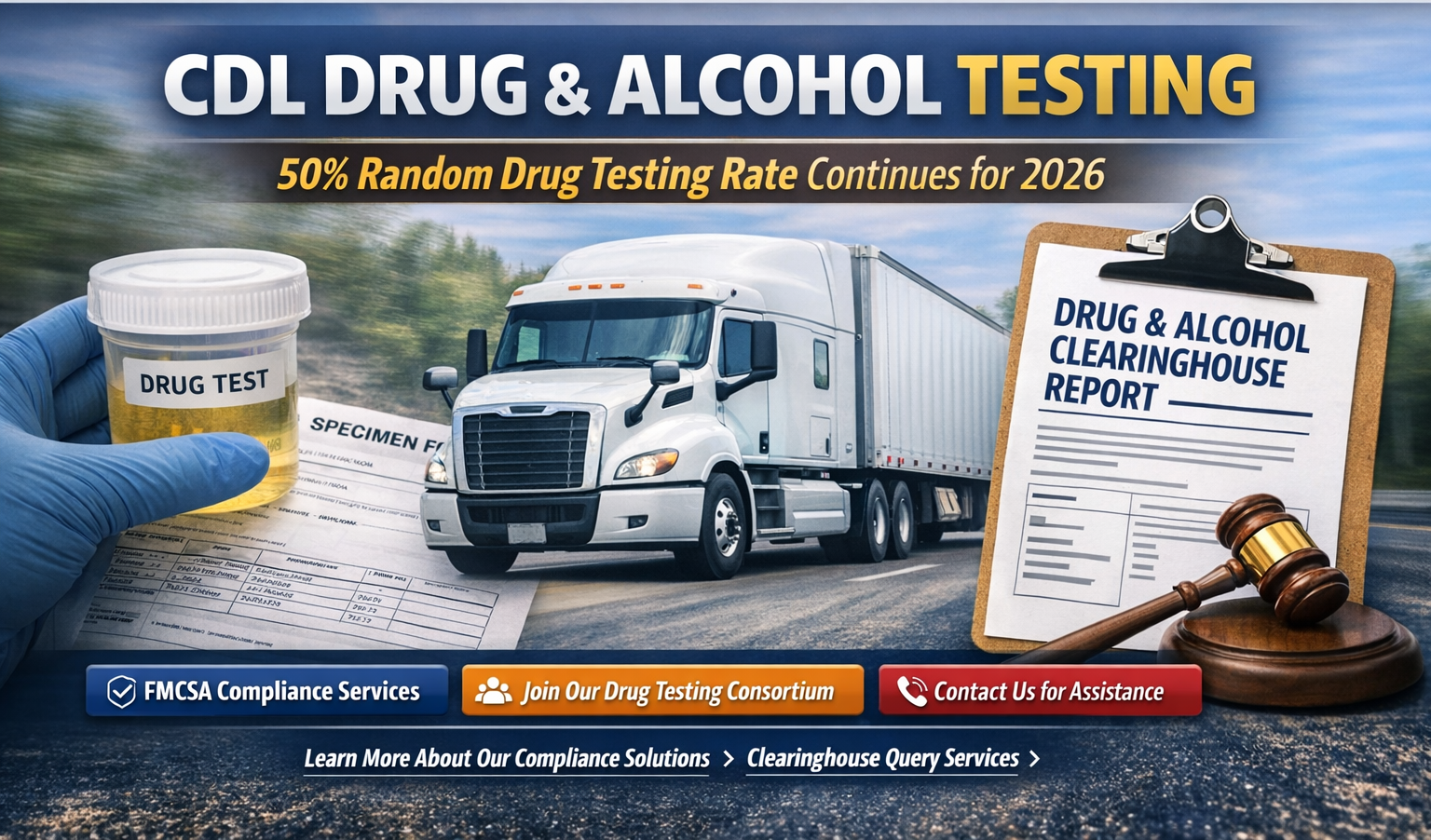DOT Drug & Alcohol Consortium Basics
June 5, 2025
Share this article:
(But Really Should If You Operate Commercial Vehicles)

If you’re in the transportation industry and run commercial vehicles, there’s a good chance you’ve heard about the DOT Drug & Alcohol Testing Program. But what you may not realize is that staying compliant with these federal requirements isn’t as simple as keeping a clean driving record or passing a pre-employment drug test.
That’s where something called a DOT Drug & Alcohol Consortium comes into play—and it’s one of the most misunderstood compliance tools in the industry.
What Is a DOT Drug & Alcohol Consortium?
A DOT Drug & Alcohol Consortium (also called a Third Party Administrator or TPA) is a service that helps motor carriers comply with the U.S. Department of Transportation’s drug and alcohol testing requirements for safety-sensitive employees—most commonly drivers who hold CDLs (Commercial Driver’s Licenses) and operate vehicles over 26,000 lbs. or transport hazardous materials or passengers.
The consortium handles key responsibilities such as:
- Managing random drug and alcohol testing pools
- Ensuring compliance with 49 CFR Part 382 regulations
- Coordinating pre-employment, post-accident, return-to-duty, and follow-up testing
- Retaining test results and documentation for DOT audits
Why You Might Think You Don’t Need One (But You Probably Do)
Many owner-operators and small fleet managers assume they’re too small to be part of a formal testing pool. In fact, that’s exactly why the consortium exists.
If you're a solo CDL operator...
You cannot randomly test yourself—so you must enroll in a consortium to meet the random testing requirement.
If you have a small team of drivers...
You can technically manage your own testing pool, but DOT compliance demands detailed recordkeeping, strict timelines, and knowledge of federal testing thresholds. For example:
- 50% of your drivers must be randomly tested for drugs annually
- 10% must be randomly tested for alcohol annually
- You must demonstrate compliance in the event of a DOT audit
It’s a heavy lift—one that most small carriers don’t have the capacity to manage internally.
What Happens If You Don’t Enroll?
Failure to comply with DOT drug and alcohol testing regulations can result in:
- Out-of-service orders
- Civil penalties (fines of up to $10,000+ per violation)
- Revocation of DOT operating authority
- Disqualification of drivers
Worse yet, post-accident liabilities increase dramatically if the driver was never part of a compliant testing program.
What a Consortium Typically Provides
Here’s what a reputable consortium should offer:
Random Testing Management - Monthly or quarterly driver selections, notifications, and tracking
Test Scheduling - Access to thousands of collection sites nationwide
MRO Review - Medical Review Officer services to verify test results
Recordkeeping - Secure storage of Chain of Custody Forms, MIS reports, and test results
Audit Support - Assistance during DOT audits and safety reviews
DER Guidance - Help for the Designated Employer Representative (often the owner or manager)
Costs: More Affordable Than You Think
Most consortium programs charge $100–$300 per year per driver, plus per-test fees (usually $50–$75). Compared to the fines, risks, and audit stress of noncompliance, it’s a small investment in peace of mind.
How to Choose the Right Consortium
When selecting a provider:
- Ensure they comply with FMCSA and DOT guidelines
- Ask about their MIS reporting and audit support
- Confirm they offer nationwide testing site access
- Read reviews or request references—you’re trusting them with your compliance
Final Word
The DOT Drug & Alcohol Testing Program isn’t optional. And it isn’t just a one-time test—it’s an ongoing compliance requirement that applies to owner-operators, carriers, and logistics firms alike.
Whether you’re running a fleet of 50 or operating solo with your own authority, a Drug & Alcohol Consortium isn’t just a checkbox—it’s your safety net.
Need help getting enrolled or evaluating your current testing program?
National Fleet Services LLC operates a number of fully compliant DOT consortiums and can help you align your tax, regulatory, and safety obligations under one strategic roof.
fleet insights






